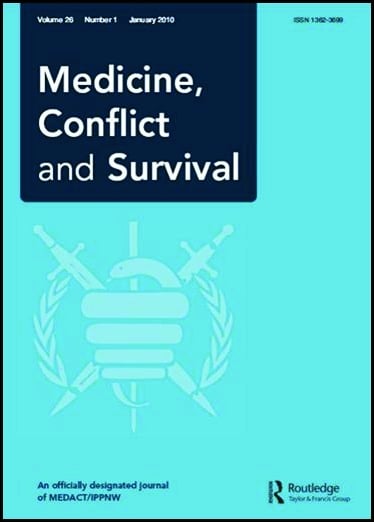
Medicine, Conflict and Survival is an international journal for all those interested in health aspects of violence and human rights. MCS is the designated journal of Medact and its international partner IPPNW. It was founded in 1985 and was originally published under the title of Medicine and War. It is published quarterly by Routledge and continues to play an important role in debates around health, peace and violence. Visit the Medicine, Conflict and Survival website on Routledge.
It publishes material on the following issues:
- The causes and consequences of war and group violence.
- The health and environmental effects of war and preparations for war, especially from nuclear, radiological, chemical and biological weapons of mass destruction.
- The influence of war and preparations for war on health and welfare services and the distribution of global resources
- The abuse of human rights, its occurrence, causes and consequences.
- The ethical responsibility of health professionals in relation to war, social violence and human rights abuses.
- Non-violent methods of conflict resolution.
- Medical and humanitarian aid in conflict situations.
- Relationships between the environment, development and global security.
- The roles and responsibilities of governments and of international governance in reducing the risk of violent conflict
One article from each issue of Medicine, Conflict and Survival is made freely available on-line.
Every year, MCS hosts the Holdstock-Piachaud Student Essay Prize, set up to encourage students to explore the themes covered by the journal in memory of Douglas Holdstock and Jack Piachaud who were for many years inspirational editors of the Journal.
The winners of the 2023 H-P Prize are:
Koichi Sakakibara, Hiromi Ieda & Shinsaku Shiode, Johns Hopkins Bloomberg School of Public Health: Change the Mindset on Nuclear Weapons: Health Experts Use Their Professions to Prevent Global Health Threats
Jack Burnett, London School of Hygiene and Tropical Medicine: What are the roles for health professionals in addressing the rising threat of the use of nuclear weapons? With particular reference to the activities of the Medical Association for the Prevention of War 1951-1963.
Georgina Miles, University of Oxford Green Templeton College: How can healthcare systems become more resilient to the impacts of climate change?
Omar Alrawi, University College London: What are the obstacles to effective international cooperation to reduce the global burden of NCDs? How can they be overcome?
Medicine, Conflict and Survival is administrated by Medact.